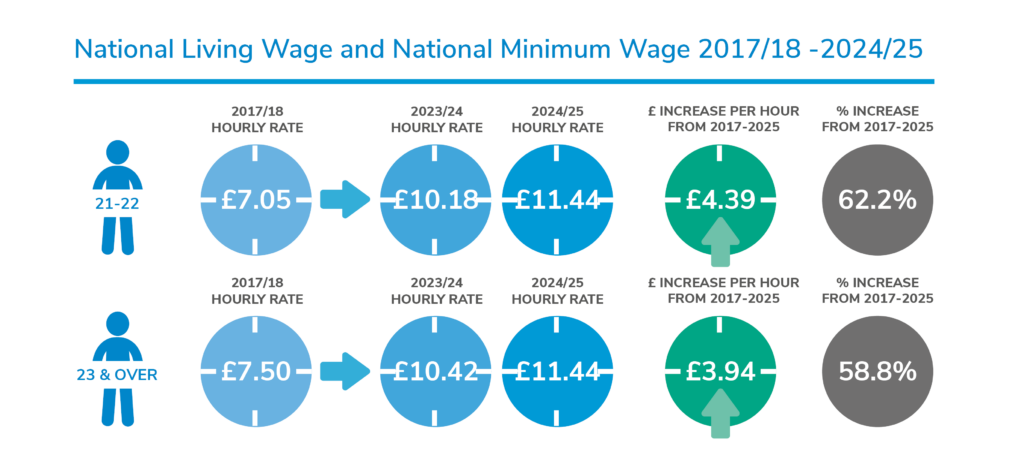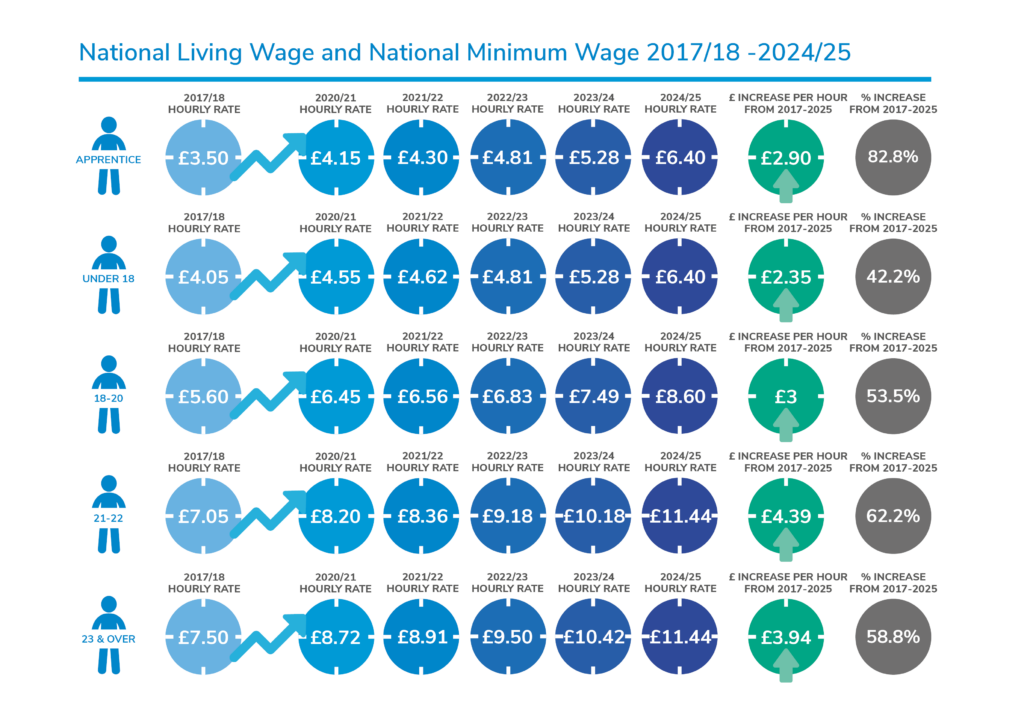
National Living Wage will rise to £11.44 per hour from April 2024
From next April the National Living Wage will rise to £11.44 per hour from £10.42, a rise over more than £1 and the largest ever cash increase to the minimum wage.
The current rate of £10.42 applies to workers over 23, but the Chancellor has announced that the rate will also apply to 21 and 22-year-olds.

The announcement came just hours before Jeremy Hunt delivered his Autumn Statement, where he set out the government’s current tax and spending plans. None of these included any measures specifically to support nursery businesses.
At Conservative party conference in October the Chancellor announced that the national living wage would rise above £11 from April. This latest announcement results in a 9.8% increase for workers aged 23 and over and 12.4% for 21-year-olds. The current rate paid to 21 and 22-year-olds is £10.18 an hour.
For younger workers, a separate National Minimum Wage will continue to apply to 18-20- year-olds, 16-17-year-olds and apprentices aged under 19 or in the first year of an apprenticeship.
Responding to this announcement, Purnima Tanuku OBE, CEO of NDNA said:
“Although this new minimum wage rate will support millions of low-paid workers during a difficult time, it is not going to be painless for employers to implement.
“From April 2024, early education and care providers will be expected to deliver additional funded places for two-year-olds. Unless the Government increases the funding rates for all children to include this hike in minimum wages, the expansion policy will be completely undeliverable.
“The early years sector employs a large percentage of young people, so will be disproportionately affected by the wider age range moving into the higher pay bracket. Nursery employers will also need to boost wages of more qualified and experienced staff to keep those pay differentials in place.

The Chancellor accepted the Low Pay Commission’s recommendations, the body that advises government on the minimum wage included evidence given by NDNA’s CEO, Purnima Tanuku.
Purnima Tanuku commented further by saying:
“NDNA gave evidence to the Low Pay Commission which recognises in its report that in some low pay sectors employers are ‘highly constrained’ by their ability to pass cost increases on. From April, the IFS estimates that the Government will be buying 80% of early years places, so employers are entirely reliant on the funding rate being sufficient for them to deliver high quality early education and care.
“Since 2017 when the National Living Wage came in, it has increased by 52 – 62%, yet the funding rate for early years places has only risen by 21%. This disconnect must be rectified.
“We have been lobbying the Government for years to remove unfair business rates from nurseries and hope that the Chancellor can finally announce this today in his Autumn Statement. If he wants to help businesses, he must support the early years sector which is fundamental to our economic infrastructure and ensures our children’s futures.”
As the largest ever increase in the minimum wage, the Chancellor’s latest announcement is estimated to benefit 2.7 million low paid workers.
Bryan Sanderson, Chair of the Low Pay Commission said:
“The National Living Wage has delivered an improved standard of living to thousands of people who care for our children and elderly, work in farms and shops and at many other essential jobs. These efforts over the lifetime of the NLW mean over £9,000 p.a. more to a full time worker without any increase in unemployment.
“This hasn’t been easy for employers, with the economy facing a range of unprecedented challenges in recent years. The high degree of political and economic uncertainty has made assessing and forecasting the performance of the economy, and therefore our task, very difficult. It is a tribute to my fellow Commissioners that we have continued to achieve consensus.
“Our new recommendation of a National Living Wage of £11.44 attempts to steer a path through this uncertainty and achieve the government target of two-thirds of the median wage, an outcome which if accepted would position the U.K. at the forefront of comparable economies.”
Jeremy Hunt confirmed the minimum wage rises during his Autumn Statement which also included:
- 110 growth measures to support business
- £50m additional for apprentices in key areas where shortages – eg engineering
- Business rates relief of 75% for retail, hospitality and leisure businesses
- NI for employees will reduce from 12% to 10%
Commenting on the statement, Purnima Tanuku OBE, CEO of NDNA said:
“In his Autumn Statement today, the Chancellor announced 110 growth measures to support businesses but not a single one will help the early education and care sector which is at crisis point. The Government seems to care more about pubs, shops and the technology sector than our children’s futures.
“Nurseries are a crucial part of our economic infrastructure enabling parents to work and they lay the foundations for our children’s lifelong learning. Only eight months ago, the Chancellor announced the expanded funded childcare offer from April 2024. Despite this promise, he hasn’t offered nurseries any new measures today – such as scrapping business rates or even offering a discount – which could really make the difference between thriving and having to close.
“This was a last chance for the Chancellor to provide much-needed support in the form of addressing underfunding, business rates and staffing. NDNA has been lobbying hard for business rates relief along with other organisations including the Education Committee. Since April, the average nursery’s business rates bill has increased around 40% to £21,000.
“For years the Government funding rate has not kept pace with business costs, especially minimum wages some of which have risen by 62% since 2017. The current funding rate for three and four-year-olds is just 21% above the 2017 rate. Our research shows that 83% of nurseries expect to make a loss or only break even this year, because the average shortfall for funded places is £2.31 per child per hour.
“Nurseries are relying on Government funding rates for early years places that will meet their costs. From April with the Government buying 80% of childcare places, they are effectively price fixing. They need urgent support now or the expansion policy faces defeat.”
- England
Similar Articles
Government publishes its strategy “Giving every child the best start in life”

Government announces plans for 1,000 Best Start Family Hubs


